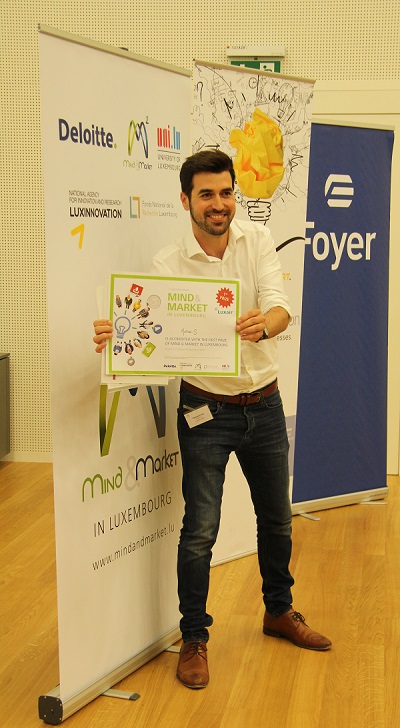
Scientists of the Interdisciplinary Centre for Security, Reliability and Trust (SnT) of the University of Luxembourg are the winners of the “Mind & Market” competition organised by Deloitte, the University of Luxembourg, the Fonds National de la Recherche (FNR), Luxinnovation and Mind & Market Belgium.
The SnT researchers want to make driving on the roads safer and more environmentally friendly. They have developed a mobile application that helps drivers to be part of the solution. The app is called “Game of Roads” and playfully motivates people to adopt a considerate and economical style of driving. To market their app and the developmental work behind it, Dr. Raphael Frank from SnT and his group have founded a start-up company named Motion-S. The first major customer is an insurance company that wants to encourage its policyholders to drive safely. The “Mind & Market” award was handed over yesterday at the Maison du Savoir in the Esch-Belval campus.
For their project, Raphael Frank and his team at SnT use the appeal of mobile phones and computer games to young people in particular. With “Game of Roads” the researchers have developed a program that allows a mobile phone to collect information about the style of driving. The less risky the driving style, the more points the driver earns in the game, and the higher he climbs in the rankings, where he can compare his results with those of other players of the game.
“Our app uses various sensors that are found in every modern smartphone,” explainsed Dr. German Castignani, who did a lot of the developmental work together with Frank. GPS, the compass and an accelerometer deliver the most important data about the travelling motion – without the mobile phone having to be directly connected to the car. “An algorithm we developed processes the data from the sensors. It merges this data and from that creates a statistical model of the driver,” Castignani described the basic principle underlying the app. The statistical model becomes that much more precise with each trip the mobile game monitors.
So that the user’s driving behaviour can be reliably assessed, the SnT researchers had to work many variables into the computation, as Castignani explains: “The algorithm has to account for what type of mobile phone the app is running on. The quality of the sensors varies namely between different phones.” The program also has to take the type of vehicle into account – so that the naturally faster acceleration of a sports car does not lead to a worse ranking than for a compact car.
Grant in the Proof of Concept Programme of the “Fonds National de la Recherche”
“Thanks to a grant in the Proof of Concept Programme of the Fonds National de la Recherche, we were able to conduct intensive research and remove these stumbling blocks,” Raphael Frank reported. The FNR’s Proof of Concept programme provides financial support to universities and research institutes in Luxembourg to help them make their research ideas more attractive to potential investors.
At the end of 2014, the group presented the proof of concept – and quickly gained its first major customer in the form of a large insurance company. The insurance company wants to use the app to guide its customers towards safer and less risky driving. Dr. Raphael Frank takes privacy very seriously and stated “The driving performance is computed locally on the smartphone. No GPS data are transferred – the insurance company only receives the scores achieved in the game.” The program can also be used for purposes other than increasing road safety: “When used in large vehicle fleets, as operated by nursing services for example, our application can help lower the number of accidents as well as fuel consumption,” says Frank. This increases the economy of the vehicles and helps protect the environment, Frank continues. In order to develop the application further and market it effectively, this spring the SnT researchers founded their own company Motion-S. “This was only possible thanks to the support from the university, the SnT and the FNR,” Raphael Frank stressed.
Photo © Mind & Market / Deloitte: Dr Raphaël Frank, Interdisciplinary Centre for Security, Reliability and Trust of the University of Luxembourg








